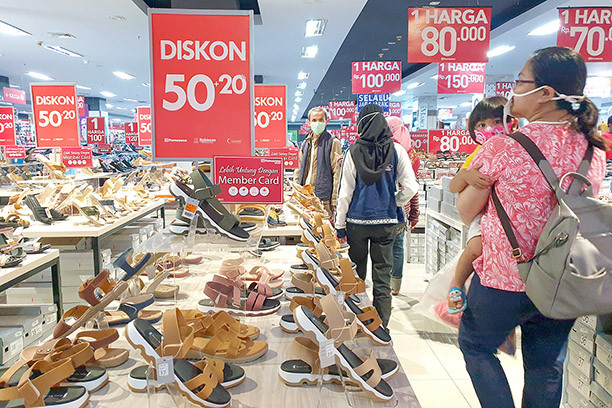Retail recovery depends on people’s purchasing power
Publicly listed retailers have reported plummeting revenue and endured losses during the first half of this year.
Change Size

T
he recovery of the retail sector from the hard blow of the COVID-19 pandemic will rely on a recovery in people’s purchasing power, which has been driven to multiyear low, analysts say.
Binaartha Parama Sekuritas equity analyst Nafan Aji said on Thursday that the reopening of malls and shopping centers could help lifestyle and fashion retailers to improve their performance following the implementation of large-scale social restrictions (PSBB) during the second quarter of the year.
“However, they will need some time to recover as the public will need time to adjust their spending habits during this pandemic,” he told The Jakarta Post over the phone, adding that consumers currently preferred to spend their money on primary needs like food.
Publicly listed retailers have reported plummeting revenue and endured losses during the first half of this year. Lifestyle retailer PT Mitra Adiperkasa (MAP) saw its revenue slumped 32 percent to Rp 6.79 trillion (US$460 million), while PT Matahari Department Store also recorded a more than 62 percent plunge in revenue to Rp 2.25 trillion, while consignment sales dropped 63.5 percent to Rp 760.07 billion. PT Ramayana Lestari Sentosa booked a 75 percent decrease in revenue to Rp 1.47 trillion.
Although the consumer confidence index (IKK) improved to 86.2 in July from 77.8 in May, its lowest level in nearly 15 years, the figure remained below 100, which signifies pessimism among customers. Indonesia's annualized inflation rate touched its lowest level since 2000 in July at 1.54 percent.
Bank Indonesia (BI) stated on Aug. 6 that the rise in confidence was caused by an improved perception of the country’s economy, as activities slowly begin to return to normal following the easing PSBB measures in many cities.
Regions across Indonesia implemented strict PSBB measures from late March to early June in an effort to curb the spread of the coronavirus, which resulted in the closure of malls and other non-essential businesses.
MAP said the COVID-19 pandemic had significantly impacted its performance during the first half of this year, a period when many retailers usually book their highest sales of the year thanks to the Ramadan and the Idul Fitri holiday.
“The closing of shopping centers during the PSBB period from early April and declining demand affected our performance in the second quarter,” the company said in a statement on Aug. 3. MAP’s nosediving top line caused the company to record a net loss of Rp 407.94 billion during the January to June period.
In addition to the easing PSBB measures, Nafan also expressed hope Christmas and New Year celebrations, along with the regional elections this December, could help boost retailers’ sales in the second half of this year.
CLSA Institute analyst Aria Santoso believed the government’s social aid programs would boost people’s purchasing power and spending on non-staple goods, like clothes, as the programs would help the middle class buy other things than food.
“Retailers should also come up with new sales and distribution strategies to help recover during this new adaptive era amid the pandemic,” said Aria.









